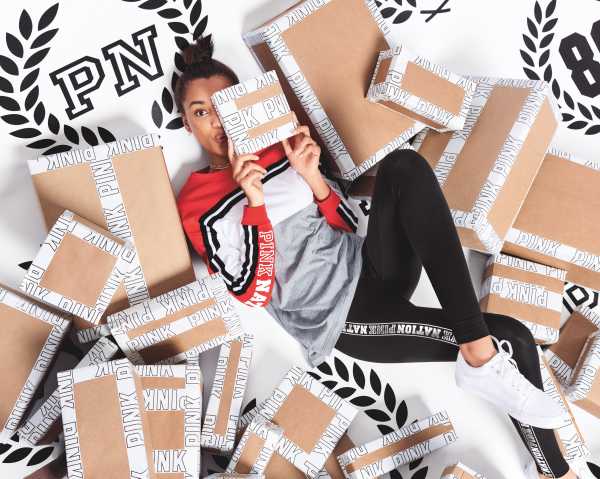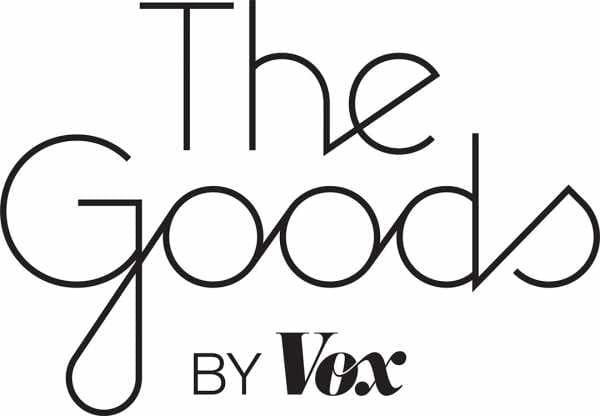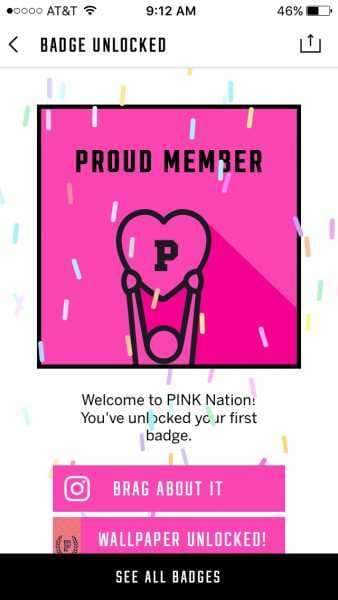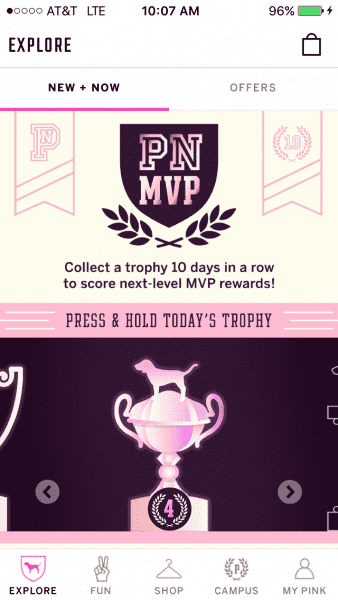

Today is the fourth day in a row that I have logged in to the new Victoria’s Secret Pink Nation app — which is explicitly for college students and not for me — and attempted to beat more than a million young people at a Pink-ified version of Candy Crush. (I have to be in the top 10 of app users to win whatever the mystery prize is!)
Yesterday, as the result of no direct action on my part other than having the Pink Nation app open for a substantial amount of time over the course of the week, I received a “Shopaholic” badge to add to my in-app badge collection. I have no idea what I have to do to unlock badges called “MVP” or “So Exclusive!” but I assume I have to start buying stuff at some point.
If I’d like to, it would be easy: Members of Pink Nation — the online “community” associated with the 15-year-old lingerie and loungewear brand’s new app — can pick any item up to $19.95 to receive for free (with a $25 purchase!). They can also peruse new daily deals every morning, and use an exclusive code to get an extra 25 percent off clearance items. There are whole outfits suggested for specific campus activities, rendering the shopping process as efficient and idly thrilling as taking a BuzzFeed quiz in the back of a lecture hall.


This is a shopping app, but Pink’s second goal is to create a new social platform for a nationwide sorority — a vast network of college-age women who find their friends and networking opportunities through a shared interest, this brand. PINK isn’t the only retailer doing this, though it’s doing it much more naturally than most.
The bet here is that the brand is as big as it can be, or big enough, on Instagram; now it can try commanding a platform all its own.
The Victoria’s Secret Pink brand has focused on college-age women for years — licensing the logos of dozens of US colleges for lines of loungewear — but now it can do so in a more explicit way. In other words: To be in college and to wear Pink clothes is a way to belong to an exclusive group.
Most of the landing screens, even within the shopping section of Pink Nation, encourage you to take outfit advice from, or otherwise connect with, your campus reps — fellow college students who spent part of their summer traveling to Columbus, Ohio, for extensive brand ambassador training (and, according to several Instagram Stories I watched, rides on a giant Pink-branded Ferris wheel?) and now dedicate eight to 10 unpaid hours per week to promoting the Pink brand at their respective colleges.
Hilary George-Parkin reported on ambassador programs like this for Racked last year, writing, “College brand ambassador programs were popularized in the early aughts as a means of reaching students who, thanks to the internet, were increasingly turning away from traditional advertising channels.” A classic example is Playboy’s fleet of volunteers, who passed out free magazines in frat houses and threw elaborate parties in exchange for campus cred as a cool (and sexy) kid. Today’s Pink reps host “study break” events at the Pink stores near their schools, distribute freebies and coupons, and mostly post on Instagram.
Pink’s brand ambassador program is recommended for marketing or fashion majors but is open to anyone who dreams of a little bit of Instagram celebrity at a large, anonymous school. On an in-app landing page informing members that applications for the brand ambassador program will soon open up for the spring semester, the responsibility listed second from the top is “be an on-campus social media influencer.”
This responsibility, it appears, is robust: The new Pink Nation app features style guides curated by the campus reps, and a press release says it will soon feature “spotlight Q&As” and original “college-relevant” content. Eventually, there will be enough material for a “college survival guide; a rich media hub with articles focused on everything from how to prepare for dorm move-in to cramming for midterms, and eventually, how to get a job.”
Though most colleges have campus-run publications that cover similar material, presumably none of those are building community by giving out free stuff or boosting their readers’ Instagram followings.
The new Pink Nation app’s task is to make shopping and “community” indistinguishable, without relying solely on Instagram.
Instagram ads have become increasingly expensive in the past two years, and they’re no longer a bargain or a sure bet. Even the Instagram-born skin care and beauty giant Glossier is reportedly building its own shopping and social media platform to get away from it.
And secret or exclusive apps for superfans are the next patch-solve: Kati Chitrakorn, reporting for Business of Fashion, pointed out last week that Adidas, Nike, Ralph Lauren, Target, and StitchFix have all either launched or expanded “exclusive” apps in the past month, designed to loop shoppers in to “addictive” daily challenges and build customer loyalty.
Mark Taylor, a president of customer engagement at the consultancy firm Capgemini, told Chitrakorn that these apps turn all of their users into brand ambassadors, who will spend up to twice as much as other customers, and that launching an app like this one can be linked with an annual revenue increase of up to 5 percent.
Why wouldn’t you become a Pink Nation app user and brand loyalist?
The key question is, I guess — if you are a college student, and not me, an adult playing iPhone games she is bad at, and winning no free underwear — why wouldn’t you become a Pink Nation app user and brand loyalist? Why not get a slight edge in the job market by advocating for a relatively affordable thing you were likely going to buy anyway? Don’t you want to have girls all over campus seeking you out, becoming more and more grateful to you? Wouldn’t it be easy enough to pull your eyes away from organic chemistry or whatever and log in to just one more app to see what your crew is up to? The future is uncertain, and anxiety is lucrative — people will always spend money to get away from it.
(Also inside the app: You can apply for a Pink Angel credit card, which has a high variable interest rate of 26.49 percent.)
“It’s, like, my dream to be a social media influencer,” Ohio State University campus rep Megan Shahroozi told her campus newspaper last fall, thanking Pink for furthering her career and loading her up with free merch. The student journalist she spoke to for the piece — titled “The Secret is Out: Everything to Know About Campus Reps” — wrapped things up with an apparently sincere thanks of her own: “Free panties have united the Bobcat family, all thanks to our campus representatives.”
Now, the Bobcat family can be united with the entire country.
Sourse: vox.com






